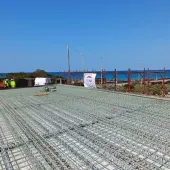Bauer delivers deep foundation works for Giza metro expansion
Bauer is undertaking specialist foundation engineering works on the new Giza Station in Cairo, set to be one of the deepest metro stations in North Africa at 81 metres. The project, part of the expansion of Cairo Metro Line 4, has clear relevance for the UK concrete sector given the scale and technical complexity of the deep foundation methods involved.
Commissioned by Orascom Construction, Bauer Egypt – the local subsidiary of Bauer Spezialtiefbau – began work on the site in November 2024. The scope includes the construction of approximately 49,000m² of diaphragm walls and 7,400m² of barrettes. These elements reach depths of up to 81 metres and are designed to support loads of up to 3,600 tonnes. Once complete, the Giza station will cover more than 5,500m².
The works are being delivered in double shifts, six days a week, using equipment including the Bauer MC 96 duty-cycle crane. As of May 2025, 84 of the 209 planned diaphragm wall panels had been installed.
Karim Galal, project manager at Bauer Egypt, said: “At this size and depth, there’s zero tolerance for deviation – every centimetre counts. The Bauer Construction Process provides us with a clear structure and guidance. It ensures that everyone involved in the project works to the same standards and helps us achieve our goals on time.”
The complex geology and dense urban setting have posed significant challenges. The site is being excavated in phases due to space limitations and the need to backfill sections of existing tunnel infrastructure. In a first for Egypt, tunnel boring machines are also operating vertically one above the other, requiring careful coordination across trades.
Galal added: “We’re working under highly unusual conditions with extremely tight space and immense time pressure. The logistics, the depth, and the constant coordination with other trades present daily challenges, but that’s exactly what makes this project so special.”
Specialist foundation works are expected to be completed by the end of 2025.







